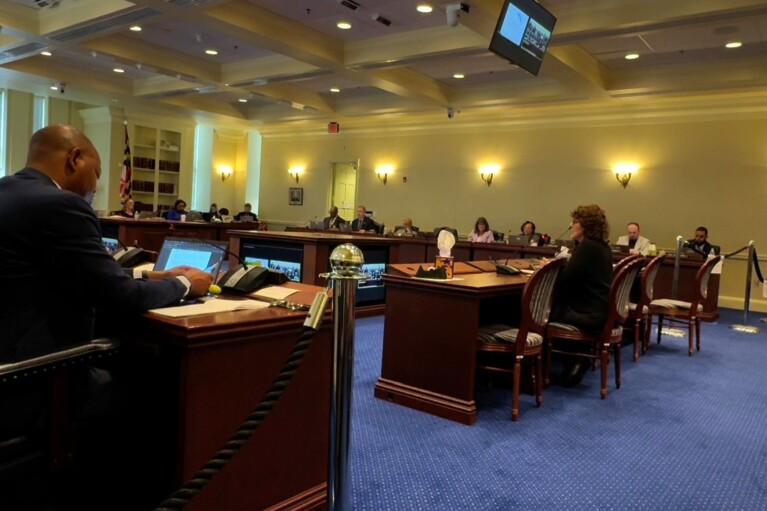Senate Debates Bills to Add Qualifications to High-Level Executive Positions

Qualifications for top government officials were at the center of debate on the Senate floor Thursday evening — and in an unusual move, a bill to require additional expertise from future Maryland secretaries of Aging was sent back to committee after lawmakers objected, saying the changes could interfere with Senate’s role in confirming or rejecting nominees.
House Bill 430, introduced by Del. Kenneth P. Kerr (D-Frederick), would require any future secretary of Aging to:
- Have “extensive experience with and knowledge of” laws, legislation and regulations on aging and programs for aging individuals;
- Demonstrate a commitment to the missions of the federal Older Americans Act and the Maryland Department of Aging; and
- Have at least a bachelor’s degree. That requirement was removed in the House of Delegates but added again by the Senate Finance Committee.
Sen. Shelly L. Hettleman (D-Baltimore County), who sponsored the Senate version of the bill, said the additional requirements for future heads of the Department of Aging would let appointees hit the ground running. But some senators argued the bill could undermine the Senate Executive Nominations Committee’s oversight ability.
Vehemently opposed to the bill was Sen. Benjamin F. Kramer (D-Montgomery), the younger brother of Maryland Secretary of Aging Rona E. Kramer. He noted the bill wouldn’t affect his sister and said his opposition was rooted in the bill’s being a “slippery slope.”
The General Assembly has passed a measure this session that would require future secretaries of Health to have experience working with or in the healthcare field, House Bill 287, sponsored by Del. Joseline Peña-Melnyk (D-Prince George’s).
Sen. Ronald N. Young (D-Frederick), chair of the Senate Executive Nominations Committee, also questioned the General Assembly’s additional criteria for secretary appointees.
Young said any additional requirements for cabinet appointees should be universal and limited to issues including a residency requirement and having some relevant experience and management experience.
To change qualifications one-by-one would take years to finish, he said.
Sen. James C. Rosapepe (D-Prince George’s) took issue with requiring a bachelor’s degree, and said the provision was “irrelevant” because it doesn’t specify that the bachelor’s degree needs to pertain to aging.
As to having familiarity with federal law, Rosapepe said “that’s exactly what you have staff for.”
Hettleman added that familiarity with the Older Americans Act, a federal law that funds services for seniors nationwide, is particularly important since much of the Department of Aging’s funding comes from the federal government.
“We need a leader who has expertise in this area to step into the job on Day One ready to go,” Hettleman said.
Sen. Craig J. Zucker (D-Montgomery) made a motion to send the bill, which was up for a final vote Thursday, back to the Finance Committee for further consideration.
The committee chair, Sen. Delores G. Kelley (D-Baltimore County), pushed back.
“I think it would be kind of sad to recommit it,” Kelley said, adding that she felt it made sense to require future secretaries of aging to be familiar with a federal law that supplies the bulk of their agencies’ funding.
On a voice vote, the Senate sent the bill back to the Finance Committee.
Hettleman said she wasn’t surprised that it was recommitted and added that she doesn’t think the bill is likely to come back to the Senate before the end of session.
“I don’t think it was too prescriptive — but my colleagues disagreed,” Hettleman said.
Kelley said the bill was likely “dead” for the session.
Cybersecurity oversight changes
Also on Thursday, Senate Republicans criticized a pair of bills intended to strengthen the state’s cybersecurity program, saying the legislation was too complicated and pushed through too quickly.
Having just finished the debate on qualifications for the Aging secretary, Republicans said they were baffled about the need for strict qualifications, under one of the bills, for a top cybersecurity post.
House Bill 1202 generally codifies measures established under an executive order issued by Gov. Lawrence J. Hogan Jr. (R) in 2019, including making the state chief information security officer a permanent position and establishing candidate qualifications.
Senate Minority Leader Bryan W. Simonaire (R-Anne Arundel) said that — in light of the conversation about the bill that was sent back — it was interesting that the bill would require confirmation through the Executive Nominations Committee and also have so many requirements.
Under that bill, the chief information security officer must have a bachelor’s degree and appropriate cybersecurity or information technology certifications, as well as experience with:
- Identifying and assessing security controls;
- Infrastructure, systems engineering and cybersecurity; and
- Technical security management, security operations centers and incident response in cloud networks.
Additionally, candidates are required to have extensive knowledge of concepts, best practices, and procedures in information technology and cybersecurity and security regulations and legislation.
“I think some of them are very specific,” Simonaire said. “Why put it so specific in the law that [it] would make the pool smaller, that we possibly can’t get the best person and leave it up to the [Executive Nominations Committee]?”
Sen. Katie Fry Hester (D-Howard), a co-chair of the Joint Committee on Cybersecurity, Information Technology, and Biotechnology who defended the bill on the Senate floor, said the qualifications were added as a House amendment, after consulting with experts from around the United States.
“Furthermore, it’s not a secretary position,” she said. “It’s a highly technical cybersecurity position.”
The bill received preliminary approval in the Senate Thursday evening and is expected to receive final approval on Friday.





 Creative Commons Attribution
Creative Commons Attribution